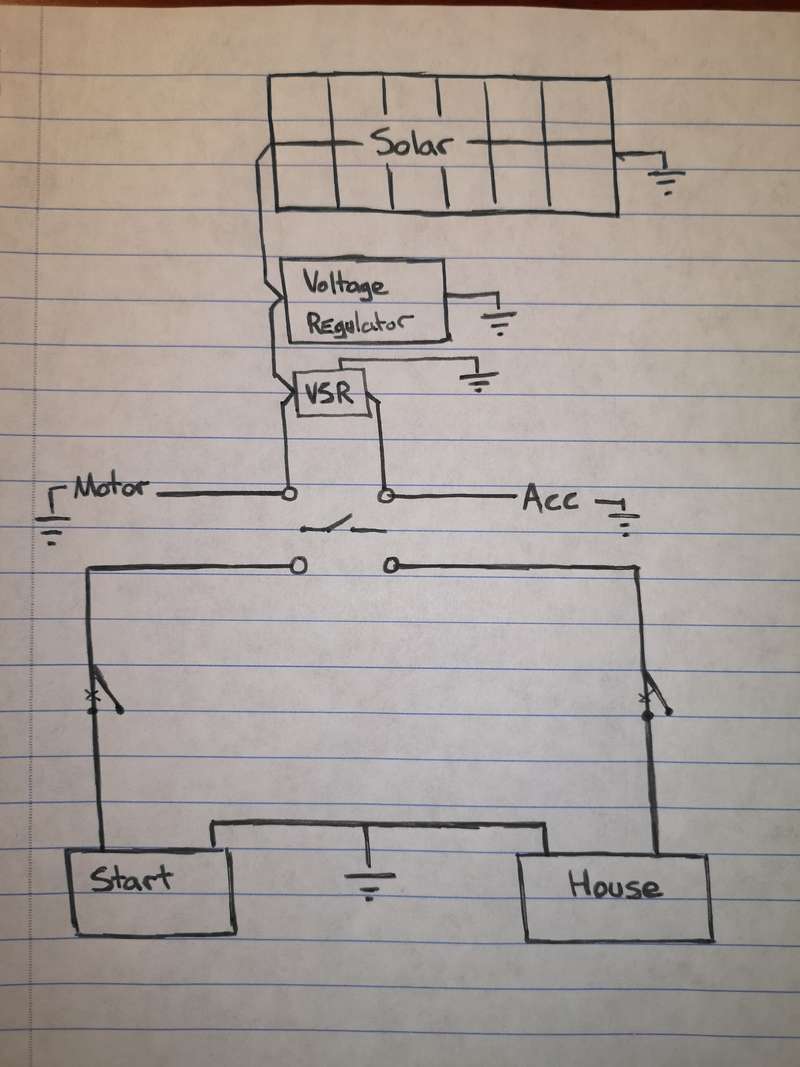Boat wiring check
Hi guys,
I have a small boat with only a starting battery which also runs the accessories.
I would like to add a 2nd battery (deep cycle) to power the accessories and keep the current starting battery for just that. Adding solar to keep both batteries charged is also something I would like to do. The motor in a Yamaha enduro with an aftermarket alternator fitted however I don't know how much charge it actually delivers and would like solar as well for piece of mind.
What I am wondering is the wiring diagram I have drawn below correct? If someone could cast an eye over it and give some feedback it would be appreciated.
Acc = Accessories
VSR = voltage sensitive relay
house/accessories battery = same thing (deep cycle battery).
Thanks in advance!!




dmck
Posts: 494
Date Joined: 07/03/19
Generally OK with a couple of comments....
I'm not sure the solar regulator will output enough voltage to activate the VSR, you need to check .
You should condider a blocking diode (cheap, less than $5) between VSR and Solar regulator JUST-IN-CASE the output from the alternator can damage the regulator
Keep the battery isolation switches JUST WHERE THEY ARE!!............. UNDER NO CIRCUMSTANCES do you connect the 'common swich' on the battery side of the isolation switches.
Check the specs on the aftermarket alternator, you may be pleasantly surprised.
scubafish
Posts: 964
Date Joined: 15/08/12
Try
https://www.youtube.com/watch?v=1xh9l6JiPBc
dmck
Posts: 494
Date Joined: 07/03/19
Just be a little careful...
THe general circuit diagram given in the video is the same as yours, minus the 2 battery isolation switches.
... and whilst he says you may not need a solar regulator, dont assume you dont assume you will not need one.
Check the open circuit voltage of the solar panel, it may be around 18 volts, and the maximum current from it will be at the top voltage.
For example, a 80 watt panel I used had an open circuit volyage of 18 volts, so the maximum possible current was 80/18= 4.5 amps.
But 18 volts is too high a voltage to charge batteries 'long term', so you need a voltage regulator to drop the 18 volts to approx 14 volts to 'float charge' the batteries.
THe other aspects of his smart regulator are all good for a complex solar power system, but take it from my experience, ( I have installed and still maintain several 12/24volt solar systems in remote shacks), unless you are right across the operation of the regulatr you should keep it very simple-- as per your diagram. I set my first one up using all the facilities of the smart regulator but when the non technical owners and their extended famly started to fiddle they turned it all off. ITs 300km each way for me to do a service call and as they are close friends I dont get paid (but I do get to use their shack!!!)
thisguyneedshelp
Posts: 5
Date Joined: 26/02/20
Thank you very much Dmck and
Thank you very much Dmck and Sucbafish. Very helpful input.
I'll be sure to check the specs on the VSR. I didn't even consider it. I just assumed that using a 250w solar panel it would be all good.
As for the solar regulator, despite the advice in the video I'm faily set on using one. I'd like to have the batteries on a constant "trickle charge" when parked up at home or off camping. I will be sure to check the output of the alternator when I get a chance, hopefully I am surprised in a good way...!
Dmck, thanks for the tip on the diode 100% I'll be adding one. So cheap it would seem unwise not to do so.
Again, thank you very much for the help!!
dmck
Posts: 494
Date Joined: 07/03/19
250 watt solar panel.
I reckon the output voltage will be 36 volts. You will need a regulator.
250watt, 36 volts =7 amps. This is the maximum current you can use to charge your battery. So in effect you will have a 14volt at 7amp = 100w solar charger. If you havent got the panel for free you are paying for a lot of power you cannot use.... and 250W panels are not small.
If you want to "go silent" for more discussion I have messaged you my email address, I can go in to a lot more detail if necessary..... and its no trouble for me.
As I said on another site... Experience is only really useful if you share it.
thisguyneedshelp
Posts: 5
Date Joined: 26/02/20
Hi Dmck, Sounds like your a
Hi Dmck,
Sounds like your a man who knows about these things so I'd really appreciate the detailed version. I figured the bigger the solar panel the better the potential for quick charging/better output on overcast days. However as you can probably tell I'm trying to get my head around all this via google and now this thread. I didn't get your email address but will send you mine, however, maybe if the discussion is public others could learn from it...?
Thanks!